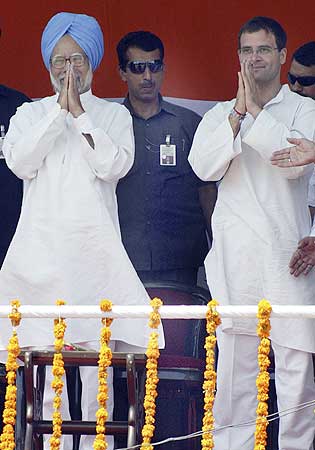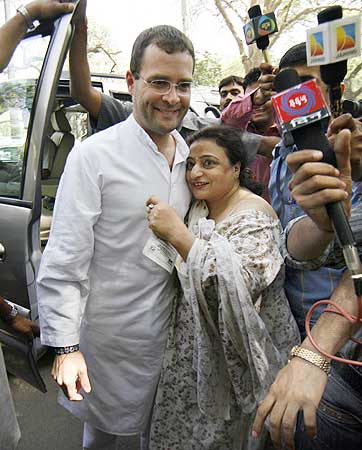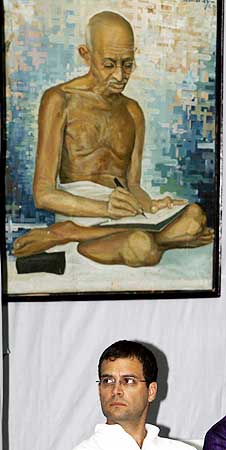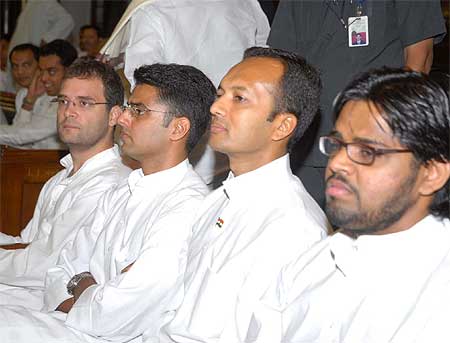
Much before any political party, including the Congress, started dealing with Election 2009, Rahul Gandhi put his political mission on track when he took charge of the National Students Union of India and Youth Congress on September 24, 2007.
He disagreed with older Congressmen on many issues, but did so without rocking the boat. He wasn't a rebel but he isolated himself from Congressmen.
He himself criticised his dynastic links.
In Uttarakhand, he told a group of girls last year, "I would not have been here if I was not from a political family. If you do not have money, family or friends, you cannot enter politics." He confessed it was "easy" for him to get an entry into politics as his father, grandmother and great grandfather too were in politics.
"But I want to change this," he had then said.
The recent election shows that he has not been able to achieve his goal because the issue is too complex, but he alone can't be blamed for it.
It is interesting to note that Rahul Gandhi set out to achieve "democracy" within his party. That was his first political mission. He thinks that intra-party democracy would solve many of the Congress's problems. Once he took charge of the Youth Congress and NSUI, he called meeting after meeting and arranged many workshops. How do you market the Congress brand? How do you get many more members? How do you ensure polling in every booth in favour of the Congress?
Multinationals like Glaxo and Pfizer get their sales pitch out through an army of salesmen with a proper command and control structure. The young crowd within the Congress arrived at the decision that political parties should do the same as well.
Rahul saw that the Congress doesn't have enough members to market it up to the people's homes as the Bharatiya Janata Party does with its own cadre and that of the Rashtriya Swayamsevak Sangh. Within the Congress the process of enrolling members was defective and at most times fraudulent. He asked experts, how do you get more members, and how to make things transparent?
Out of that came the programme called Vistaar, and the idea of having aam admi ke sipahi.
Rahul took the help of the Foundation of Advanced Management of Elections, founded by former chief election commissioner James Lyngdoh, to conduct Youth Congress elections.
Dr Jairam, a US-based management expert, helped in moving Rahul's ideas forward. A method was devised to get new members. In Punjab and Gujarat, the membership drive produced impressive results in some manner, at least.
Every member has been registered properly at a fee of around Rs 20; for Scheduled Castes, Scheduled Tribes and the poor the fee was Rs 10. Records were computerised to keep track of all the members.

The Youth Congress claims that Punjab enrolled some 3.5 lakh members and Gujarat, 7.2 lakh members. But the money spent on Vistaar was many times more than what was collected through membership drives. To handle the Youth Congress office-bearer elections, lakhs of rupees were spent in Punjab and Gujarat. In fact, some defeated candidates complained that Rs 10 lakhs or more has been spent on "buying" new members in Punjab.
One of the observers in the Youth Congress election process in Surat told rediff.com that the membership drive was quite fake in some parts of the city. In February some 15,000 new Youth Congress members were registered in Karanj but the Congress did not got substantial votes from the area in favour of its candidate in the Lok Sabha election.
"How is it possible that all the newly registered Youth Congress members didn't vote Congress this time?" a Youth Congress member asked.
Rahul is a man with focus so the unnerving ideological part of money matters has not stopped the drive to get membership and setting up elections.

Once they are elected they have to pay back to those vested interests who sponsored their candidature. The cycle of corruption thus goes on.
In spite of Rahul Gandhi's fresh presence, Election 2009 saw greater flow of money than before.
The Youth Congress plans are on and the drive for membership that was taken up in Gujarat, Punjab and Pondicherry will soon extend to Tamil Nadu. This exercise is important for Rahul Gandhi.
It seems that he is likely to complete the entire process of intra-party elections. Whatever little dynasty issues are left in public discourse will also be washed away and Congressmen will be able to dub him as a truly democratically elected leader of India's oldest party. This is the best possible arrangement the Congress can think of for the young Gandhi.
Inder Malhotra, Indira Gandhi's biographer and distinguished journalist told rediff.com, "In the Gandhi family they pretend they do not want power and power comes to them."
He recalled that after Lal Bahadur Shastri died in 1966, even while claiming power Indira Gandhi remained as dignified as today's Gandhi family members are. Morarji Desai stridently claimed the post of prime minister but Indira Gandhi kept dignified and silent. She coyly said, 'Let Congress president Kamraj decide.'
Malhotra says, "Indians value renunciation of power." So, power is coming back assuredly into the hands of the Gandhi family through this Lok Sabha election.
The Gandhis have in their backyard people to take care of the rough edges of a weak organisation so the beautiful picture that reaches voters through propaganda and through the Indian media is not marred.
US-based columnist Partha Banerjee recently wrote, 'The new-generation Indian PR-journalism, its projection of Rahul as the next prime minister (eerily reminiscent of the rise of his father) and complete suppression of issues did it for the Congress.'
If you talk about standards and morals related to elections, the Congress was not above-board. Like all other parties in the race the Congress too played the caste card in the distribution of tickets, as usual. They carried on with the vote-bank of secularism and vote-bank of communalism and casteism. On May 14 Digvijay Singh had called Amar Singh of the Samajwadi party and told him in Hindi, "Bhul chuk maaf karma (forgive our mistakes)."
It was a call from the Congress to pacify the SP after the last day of voting and before the results were out.
The Congress was not expecting these many seats so Digvijay called Amar Singh to apologise if anything wrong had been said during the campaign. On receiving the call Amar Singh complained, "Aapne to Jayaprada ko nanga kar diya (You have humiliated Jayaprada)." Digvijay replied coolly, "We Congressmen don't do such things. That's not in our nature. Why don't you keep your own flock under control? Why don't you handle your own party men better?"
The accusation was that SP leader Azam Khan, who campaigned against Jayaprada and released morphed images of the actress in Rampur, was clandestinely supported by the Congress.
In spite of these kind of allegations the Gandhi family and Dr Singh's hands remained clean. While it was left to Digvijay Singh, Ahmed Patel and other loyal leaders to handle the realpolitk, the Gandhis and Dr Singh adhered to pre-written speeches.
As we can see, the aristocracy of the Gandhis is underplayed but it is not abandoned; the media was fed stories that had a high saleable value.
Many young Congress voters of Gujarat and Punjab told rediff.com that they see a great future ahead also because the resistance against the dynasty factor in Indian politics has failed. Rahul has diluted the stigma of dynastic politics by not joining the government and taking up party work instead.
So many sons and daughters of political leaders of various parties have been elected in the process that the opposition to dynastic politics has lost steam. Now onward one can't even think of any poor boy or girl without powerful connections can ever dream of winning an election to the state assembly or the Lok Sabha. It will be difficult to win even the Youth Congress president's post without money. That will be a rarity, now.
When we talk of the youth factor these days, any discussion on ideology or limits to spending money to win election is regarded as out of fashion. Thirtyfour-year old Congress candidate Manicka Tagore's win over veteran Vaiko, 65, in Virudhunagar is one such instance where the DMK spent millions of rupees to make sure that Vaiko was defeated.
Former chief vigilance commissioner N Vittal has written a column on factors that played the most decisive role in this election. He writes, 'The first is the enormous role and clout of money power.' He says, 'It reflected the reality that democracy in our country, which has perhaps the largest population of the poor, has become an exclusive game in which only the rich with tonnes of money can participate. Especially in the two critical states of Tamil Nadu and Andhra Pradesh, there were a lot of allegations about the flaunting of money power to bribe voters and entice those in the opposite camp.'
He said the second factor that played a part is the role of the family. He says as a feudal society with a claim to modernity, we Indians are very comfortable with dynasties and families. The third factor he says is that the anti-incumbency factor has not worked.
In the three key states of Tamil Nadu, Andhra Pradesh and Maharashtra, there were 'spoiler' parties which took away a chunk of the anti-incumbency vote that should have gone to the established opposition.
Similarly, Election Commissioner Dr S Y Quraishi agreed in an interview to rediff.com that one of the biggest weaknesses of Indian election is the money factor.
In the last two years, Rahul Gandhi was confronted many times with such real issues. In one such meeting, the question was debated as to what do you do when 10 goons of Mayawati's party or Mulayam Singh's SP are dominating the polling booth? Rahul Gandhi received many opinions from his colleagues, like, 'Congressmen can't fight them in the same coin. We will have to keep patience till the times change.' But, someone from his team also argued that "we should have 11 goons to scare them."
Rahul Gandhi has not answered the crucial issue yet: how will he face this Gandhian dilemma of keeping clean and yet reaching his goal? He keeps quotes from Mahatma Gandhi with him at all times on his desk.
But, in 2009, he has delayed facing the awkward moment. Precisely for this reason, this election is a turning point for the Congress.
And, in between all this churning within the Congress, success has arrived which is not just surprising and stunning but may prove to be a splendid delusion if not internalised correctly.
In fact, the story has just begun. New Delhi-based media organisations are heaping praise on Rahul and Dr Singh and solidifying their image. But, there are plenty of figures that are quite embarrassing for the Congress.
Only when the SP was found to be unreasonable, did their alliance fail.
Digvijay Singh, who was in charge of UP, told rediff.com on the afternoon of the huge win for his party: "Imagine what would have been our fate if we had accepted the 17 seats offered by the Samjawadi party!"
Then, he said, "You people do not understand Rahul Gandhi."
He explained what exactly worked about Rahul. He said that the presence of Rahul revived old memories of the people in the villages.
"The Congress has a presence in every village of UP. Those people know what the Congress stands for. Rahul went to them and reassured them."
A technocrat friend of Rajiv Gandhi, who also knows him well, argues that "Indian people have changed. People are not complaining too much, now. They are dreaming. They are talking of what they want, not cribbing about the past and history. Rahul Gandhi got connected to these minds that are looking forward into the future."
This is quite true. Rahul raises hopes for the future.
If you read Youth Congress leaders' blogs and message boards on their web site one finds that young Indians seek Congress membership not as an ideological statement but because they think it's a ticket to better jobs.
"Young Indians who are more practical than their parents and value money over political ideology will support Rahul Gandhi wholeheartedly," says a young college boy from Surat who tried unsuccessfully to contest Youth Congress elections in March.
The pictures that were splashed of Rahul Gandhi on the day after the results were telling. At the Congress's parliamentary party meeting he was encircled by his young colleagues who won impressively along with him.
Jyotiraditya Scindia, Sachin Pilot, Milind Deora, Sandeep Dixit, Deepinder Hooda, Naveen Jindal (who was sitting next to him) and Shruti Chaudhary. These are all children of powerful and rich Congressmen. The collective wealth of all those who were with Rahul could not be less than Rs 2000 crores. One would like to believe that they are all well-meaning young politicians who have won because collectively they presented the "clean" image of themselves to the aam aadmi.
Inclusive growth, sensitivity to marginal farmers and labour and minority welfare will be high on Rahul's agenda while Dr Singh through his Cabinet will try to push forward the reforms agenda with more force than before, but success is not guaranteed because after all the Congress's 206 seats out of 543 and 119 million votes out of 417 million votes that were polled does not give it absolute power to rule. The mandate's main function is to have a stable government. The Congress's victory has to be welcomed even by those Indians who have not voted for it because this one verdict has ensured that India becomes an oasis of stability in a turbulent South Asia.
Eventually, if not now, relations with Pakistan will see a shift. Dr Singh will try his best, as soon as the opportunity arrives, to make a forward move.
Now, after the stunning victory in UP, Digvijay Singh says, "We are working for the assembly elections of 2013 and the Lok Sabha election of 2014."
The Congress wants power back in Uttar Pradesh, and the entire thrust will be to ensure that nothing goes wrong in its policy decisions in the first two years, till the UP assembly election in 2012. For that, the Congress has got resolve, a business plan, a leader and, of course, tonnes of money.